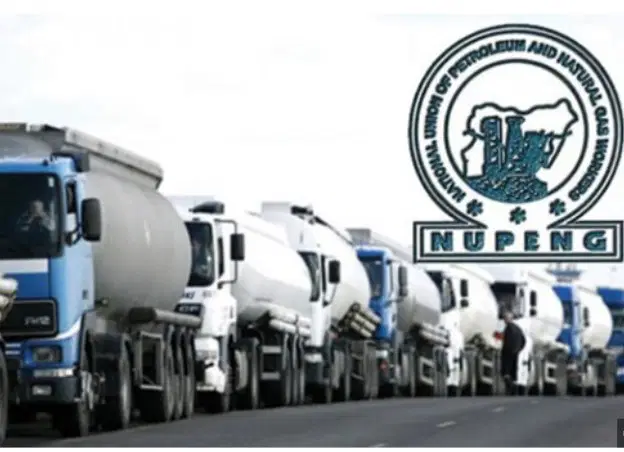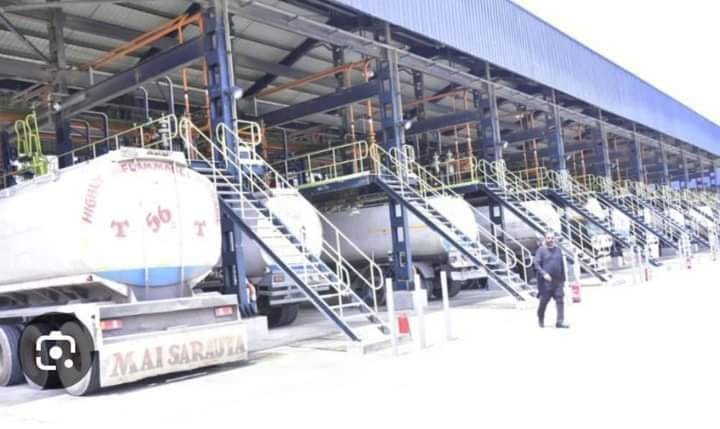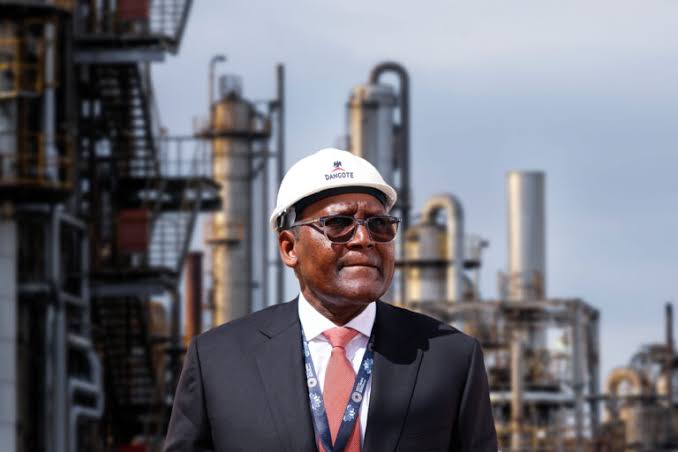National Issues
Beyond One Messiah: Will Dangote’s Free PMS Delivery Stand the Test of Time? –By Matthew Ma
Portraying Dangote as a “Messiah” has its implications. For example, it means that one individual can address the numerous challenges facing Nigeria single-handedly. In reality, what the country requires is not the emergence of a singular savior but rather the establishment of a robust and effective system that functions well across all levels. A well-structured system would ensure accountability, foster collaboration among institutions, and facilitate sustainable development. By relying on the idea of a lone hero, we risk neglecting the necessary collective efforts needed to create lasting change and improvement in Nigeria’s socio-economic landscape.

When the Dangote Refinery made its highly anticipated announcement regarding the commencement of direct supply of Premium Motor Spirit (PMS), effective September 15, 2025, the news sparked widespread enthusiasm across Nigeria. This announcement arrived as a beacon of hope for a country that has long struggled with issues such as exorbitant transportation costs, ongoing fuel shortages, and the convoluted role of numerous intermediaries in the petroleum supply chain. For many Nigerians, the promise of a direct supply line represents a pivotal shift that could significantly reduce fuel prices, streamline the distribution process, and ultimately enhance the overall efficiency of fuel availability nationwide. The elimination of middlemen could result in lower costs for consumers and a more transparent pricing structure, factors that have been sorely lacking in the existing system. However, amidst the excitement, a critical question looms: is this initiative truly a sustainable solution for Nigeria’s fuel troubles, or is it merely another in a long line of fleeting promises that have historically left consumers disappointed?

The introduction of free delivery for Premium Motor Spirit (PMS) by Dangote could herald a significant transformation in Nigeria’s petroleum sector. This initiative aims to enhance the accessibility and affordability of fuel for consumers in both urban and rural areas. It holds substantial importance for millions of Nigerians who often allocate a considerable portion of their monthly income to transportation costs. By reducing fuel expenses, the free delivery initiative will enable households to experience a noteworthy decrease in their daily living expenses, thereby allowing them to redirect their finances towards other essential needs. Moreover, this strategic move by Dangote not only benefits individual consumers but also has the potential to positively impact the broader economy by improving mobility and stimulating trade across the nation.
Economists have posited that if the initiative is maintained over an extended period, it holds significant potential to alleviate inflationary pressures, particularly in the context of food prices. This effect is mainly attributable to the crucial role that transportation costs play within the distribution chain of agricultural products. By reducing these transportation expenses, it becomes possible to stabilize prices for essential food items, thereby enhancing their accessibility to a broader segment of the population. Experts are calling for careful consideration regarding this initiative. They underscore that an accurate measure of success for the free delivery of petroleum products will hinge on the initiative’s ability to maintain sustainability in the long term. This is particularly important in the Nigerian context, where many programs or projects may start with enthusiasm and promise, but face significant challenges when it comes to sustainability. The concern is that while the initial rollout may seem beneficial, the real test will be whether it can continue to operate effectively and without interruption over time. This perspective highlights the importance of ongoing assessment and adaptation to ensure that the benefits are not only realized in the present but also sustained in the future. Consequently, Dangote Group should thoughtfully incorporate the free delivery initiative into a sustainable and robust business model. This model must consider various factors, including market dynamics, cost management strategies, and the necessity for operational efficiency. Such an approach will ensure the initiative thrives in the long term while effectively stabilizing food prices.
Critics of the policy have raised significant concerns about its potential to distort the market dynamics in the fuel distribution sector. They argue that the practice of offering free delivery by a large player like Dangote could create an uneven playing field, making it particularly difficult for smaller fuel distributors to compete effectively. In this scenario, these smaller companies may struggle to attract and retain customers, as they are unable to match the offerings of a much larger competitor. This environment could pave the way for monopolistic practices, where initial customer loyalty gained through favorable services may gradually shift into a market characterized by reduced competition and fewer consumer choices. As the competitive landscape narrows, the market may become less resilient, leaving it vulnerable to future disruptions such as supply shortages or price fluctuations. Critics warn that the reliance on a single dominant player could diminish the overall stability of the industry, making it harder for the economy to recover from potential shocks. Despite these concerns, a segment of the Nigerian population perceives Dangote’s initiative as a form of corporate patriotism. Many view the decision to offer free delivery not merely as a business strategy but as a commendable effort to support the nation during challenging economic times. This perspective highlights the dual nature of the policy. While it aims to assist consumers and stimulate market activity, it also raises critical questions about the long-term health of the market and the maintenance of equitable competition within the fuel distribution sector.

The initiative for free delivery signifies more than a mere strategic move within the oil sector; it engages with a larger conversation about Nigeria’s profound reliance on private enterprises for essential services, particularly in the energy sector. This scenario raises an important question: Is it appropriate for a single corporation, no matter how large or influential, to control access to such a vital area as energy production? Proponents of this initiative assert that Dangote is stepping in to fill a noteworthy gap in the industry, addressing a long-standing challenge that has plagued Nigeria due to decades of ineffective governance and poor management within the refinery sector. Supporters argue that Dangote’s involvement could herald a transformative shift, introducing much-needed efficiency, fostering technological innovation, and improving service delivery—factors that have frequently been absent under the purview of state-managed entities. They posit that by applying private sector methodologies and capitalizing on industry expertise, Dangote has the potential to drive substantial advancements that would not only benefit the company itself but also consumers and the larger economy.
Furthermore, advocates suggest that Dangote’s approach might set a precedent for other corporations, inspiring a new wave of partnerships between the public and private sectors. This could pave the way for a more resilient infrastructure and enhance the quality of life for Nigerians by ensuring a more reliable and accessible energy supply. The initiative could also encourage foreign investment in Nigeria, as the success of such a venture may attract global players looking to enter a market with vast growth potential. Overall, Dangote’s entry into the energy production space could be a pivotal moment in redefining how essential services are provided in Nigeria, potentially leading to sustainable development and improved economic prospects for the nation.

Growing concerns are arising about the risks of depending solely on one corporate entity to lead such an initiative. Critics warn that a monopoly-like scenario could hinder healthy competition, which is essential for fostering innovation and ensuring consumer choice. They also contend that excessive control by one player could diminish accountability, potentially leading to malpractice or negligence, particularly if profit is prioritized over the public interest. This unease underscores the importance of establishing checks and balances, which can be compromised in a system dominated by a single corporation.
Nigerians have undeniably faced prolonged periods of hardship due to persistent fuel shortages. Long, winding queues at filling stations were once a common sight, often leading to frustration and anxiety among drivers. The rising black-market prices exacerbated the situation, forcing desperate individuals to purchase fuel at exorbitant rates, frequently putting their safety and legality at risk. Hence, fuel scarcity became the widespread national discontent and despair surrounding energy accessibility. In a significant turn of events, Dangote’s decision to supply fuel directly to marketers, bypassing traditional distribution methods that often add transportation costs, offers a glimmer of hope. By eliminating the intermediary steps that typically complicate fuel distribution, this initiative dismantles the layers of exploitation that have historically affected both consumers and local businesses. As a result, it fosters a more direct and equitable system, enabling benefits to reach those who need them most more efficiently.
Additionally, the refinery’s capacity, which is said to be the largest in Africa, presents a promising opportunity for Nigeria to attain self-sufficiency in the production of refined petroleum products. This refinery is significant, as it could lead to a substantial decrease in the country’s reliance on expensive imports that have historically strained its economy. Therefore, delivering sufficient refined products domestically will not only stabilize Nigeria’s economy but also contribute to the strengthening of the naira. The potential economic benefits of this shift could provide a much-needed respite for the country, enabling it to allocate resources more effectively and foster growth in other sectors. However, entrusting the energy requirements of a nation with a population of 200 million to a single individual undoubtedly raises significant concerns. While Dangote’s control and influence in the energy sector are undeniably noteworthy, this concentration of power poses a substantial risk of developing a private monopoly. In such a scenario, it will severely diminish competition, leading to a lack of accountability in pricing and service quality.
Currently, initiatives such as offering free delivery may seem generous and advantageous for consumers, fostering a positive perception of the company. However, this raises a critical question for the future: what bold measures should Dangote take to train those hands behind the wheel? The introduction of 4,000 Compressed Natural Gas (CNG) trucks by the Dangote Group to deliver Premium Motor Spirit (PMS) across Nigeria—at no cost to filling stations—has been hailed as a game-changer in the country’s fuel distribution system. However commendable this initiative may be, its safety and sustainability heavily hinge on one crucial element: the drivers behind the wheel. The operation of such a substantial fleet of CNG-powered trucks on Nigeria’s often hazardous road network entails inherent risks. Historically, poor driving habits, insufficient training, and lax enforcement of safety standards have contributed to road accidents, fuel tanker incidents, and devastating losses. Thus, it is essential for Dangote not only to provide trucks but also to make significant investments in driver training, road safety education, and rigorous operational guidelines. These drivers will be responsible for transporting highly flammable cargo; their discipline and professionalism could be the difference between relief at the pumps and catastrophe on the roads. We also urge the Federal Road Safety Corps (FRSC) and other regulatory bodies to collaborate with the Dangote Group to create a robust safety framework. Mandatory proper licensing, defensive driving courses, and continuous monitoring of driver performance should be prioritized. We welcome this bold intervention. Yet, for this initiative to endure, it must rest not only on the strength of trucks and logistics but also on the pillars of human capacity, safety, and responsibility.
Therefore, portraying Dangote as a “Messiah” has its implications. For example, it means that one individual can address the numerous challenges facing Nigeria single-handedly. In reality, what the country requires is not the emergence of a singular savior but rather the establishment of a robust and effective system that functions well across all levels. A well-structured system would ensure accountability, foster collaboration among institutions, and facilitate sustainable development. By relying on the idea of a lone hero, we risk neglecting the necessary collective efforts needed to create lasting change and improvement in Nigeria’s socio-economic landscape. To truly enhance our economic landscape, we must diversify our industries. Introducing a variety of competitive players into the market will help foster innovation and resilience. While the Dangote Refinery holds excellent promise as a significant player in Nigeria’s oil sector, its success must be viewed within the context of a broader reform strategy. If integrated into a comprehensive plan designed to revitalize and modernize Nigeria’s energy infrastructure, it could serve as a pivotal moment in the country’s oil history. However, there exists a significant risk if the public places all its expectations and hopes on the success of a single individual. Relying heavily on one person for economic transformation can lead to a perilous form of dependency, where progress hinges on the whims and decisions of a single leader. This could ultimately result in stagnation and a lack of resilience within the industry if that individual’s vision falters or fails to materialize. Nigerians must understand the importance of a diversified approach to reform, one that encourages multiple stakeholders to work together for sustainable growth and development in the oil sector.
While labeling Dangote as a messiah may be fraught with risks, his initiative has undeniably rekindled hope among Nigerians regarding the nation’s energy challenges. The introduction of complimentary delivery of Premium Motor Spirit (PMS) is not merely a symbolic gesture; it signifies a vital response to a population that has grown weary after years of broken promises and erratic fuel supply. Nonetheless, it is crucial to acknowledge that relying solely on a single refinery—regardless of its advancements—will not adequately address the myriad issues plaguing Nigeria’s energy sector. A proper solution for Nigeria’s energy landscape will require more than Dangote’s efforts; it necessitates a comprehensive, collective movement aimed at building robust institutions, promoting healthy competition, and enforcing accountability throughout the industry. Without alternative options, a single entity could easily impose inflated prices or compromise service quality without fear of losing customers to competitors. This reality underscores the importance of fostering a diverse and competitive energy market to ensure the consistent supply and distribution of PMS products to all citizens.
At present, there is a remarkable sense of hope among Nigerians, who are grateful for the immediate relief provided by this initiative. However, for the long-term sustainability of free PMS delivery, it is crucial to implement clearly defined policies, maintain transparent pricing structures, and foster a competitive market environment. Establishing these frameworks is essential to ensure a more equitable distribution of power and resources among all stakeholders and consumers. The crucial question facing the nation is whether Dangote’s initiative signals the start of a transformative fuel revolution or if it is simply a reprieve from the long-standing fuel crisis that has plagued the country. The answer to this question will be revealed over time, shaped by the regulatory environment, market dynamics, and the collective actions of stakeholders in the energy sector. Only through ongoing vigilance, innovation, and a steadfast commitment to systemic change can Nigerians hope to escape the persistent cycles of scarcity, exploitation, and misplaced idolization that have stymied progress in their energy systems for far too long.
Rev. Ma, S. J., is a Jesuit Catholic priest of the North West Africa Province of the Society of Jesus. He currently writes from Abuja, Nigeria.









